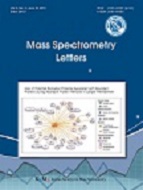
- P-ISSN 2233-4203
- E-ISSN 2093-8950


Low temperature plasma (LTP) ionization mass spectrometry (MS) is one of the widely used ambient analysis methods which allows soft-ionization and rapid analysis of samples in ambient condition with minimal or no sample preparation. One of the major advantages of LTP MS is selective analysis of low-molecular weight, volatile and low- to medium-polarity analytes in a sam- ple. On the contrary, the selectivity for particular class of compound also implies its limitation in general analysis. One of the critical factors limiting LTP ionization efficiency is poor desorption of analytes with low volatility. In this study, a home-built LTP ioniza- tion source with Peltier heating sample stage was constructed to enhance desorption and ionization efficiencies of analytes in a sam- ple and its performance was evaluated using standard mixture containing fatty acid ethyl esters (FAEEs). It was also used to reproduce the previous bacterial identification experiment using pattern-recognition for FAEEs. Our result indicates, however, that the bacterial differentiation from FAEE pattern recognition using LTP ionization MS still has many limitations.
Takats, Z.. (2004). . Science, 306, 471-.
Cody, R. B.. (2005). . Anal. Chem, 77, 2297-.
Venter, A. R.. (2014). . Anal. Chem, 86, 233-.
Harper, J. D.. (2008). . Anal. Chem, 80, 9097-.
Salter, T. L.. (2014). . Anal. Chem, 86, 9264-.
Garcia-Reyes, J. F.. (2011). . Anal. Chem, 83, 1084-.
Chen, W. D.. (2013). . Analyst, 138, 5068-.
Zhang, J. I.. (2011). . Analyst, 136, 3091-.